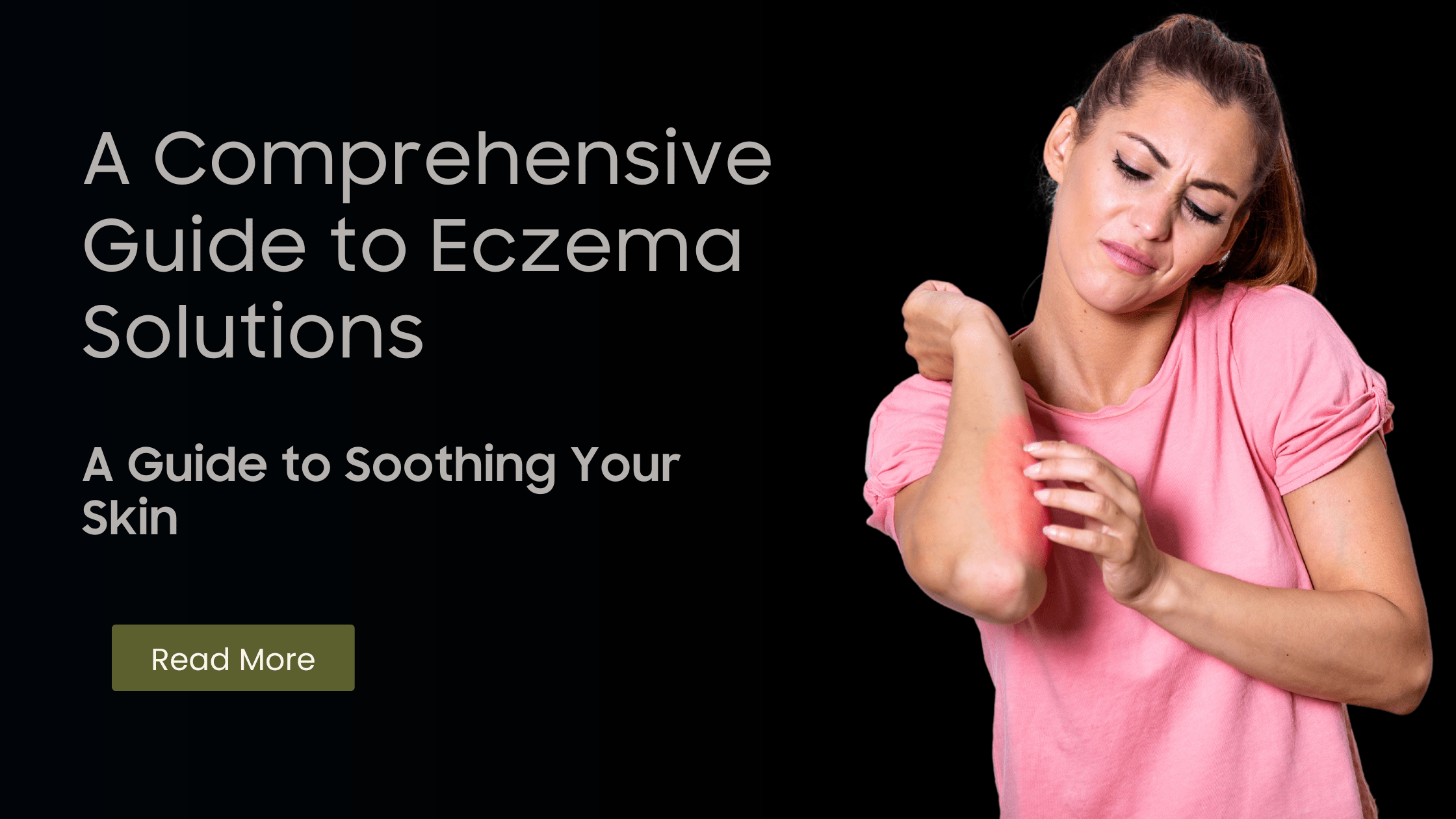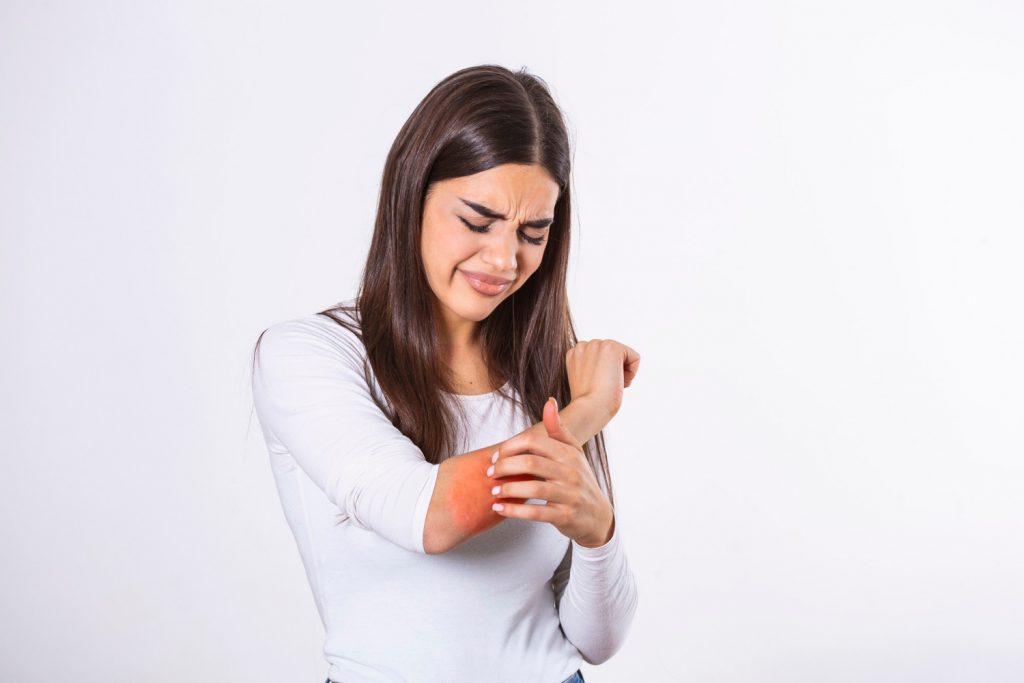
Eczema
Eczema represents a skin issue that generally manifests as dry and itchy skin patches. It’s a widespread ailment that isn’t transmissible. Its symptoms might exacerbate due to exposure to an irritant or an allergen. Although there is no cure presently, there are treatments that can aid in managing its symptoms.

Table of Contents
Overview
Understanding Eczema
Eczema represents a condition leading to the formation of dry, itchy, and bumpy skin. This condition degrades your skin’s protective function, tasked with helping your skin preserve moisture and defend your body from outer elements. It is a variant of dermatitis, referring to a series of conditions triggering skin inflammation.
Types of Eczema
Multiple types of eczema are present, each with specific triggers that may affect your skin’s protective function, including:
- Atopic dermatitis.
- Contact dermatitis.
- Dyshidrotic eczema.
- Neurodermatitis.
- Nummular eczema.
- Seborrheic dermatitis.
It’s possible to have more than one kind of eczema simultaneously.
Who Can Get Eczema?
It can affect individuals of all ages. Symptoms typically manifest during childhood and persist until adulthood. You may be at an increased risk of developing eczema if there’s a family history or if you’ve got a diagnosis of:
- Dermatitis.
- Allergies.
- Hay fever.
- Asthma.
Prevalence of Eczema
Infants are susceptible to eczema, and 10% to 20% may develop it. Interestingly, nearly half of all infants diagnosed with eczema outgrow the condition or see significant improvement as they mature.
The Onset of Eczema
The initial signs of eczema consist of itchiness, dry skin, and a rash. These indications suggest that you encountered a trigger in your surroundings leading to the onset or aggravation of your symptoms. Recognition of environmental triggers and their avoidance can lessen your risk of future eczema flare-ups.
Symptoms and Causes
Manifestations of Eczema
Its symptoms encompass:
- Dry skin.
- Itchy skin.
- Skin rash.
- Bumps on your skin.
- Thick, leathery skin patches.
- Flakey, scaly, or crusty skin.
- Swelling
Eczema Rash Appearance
It manifests differently in every individual diagnosed with the condition. For those with a dark skin tone, an eczema rash can appear purple, brown, or gray. For individuals with a light skin tone, an eczema rash may appear pink, red, or purple.
Eczema Symptom Locations
It symptoms could appear anywhere on your body. The most prevalent areas where you’d notice symptoms of eczema include:
- Hands.
- Neck.
- Elbows.
- Ankles.
- Knees
- Feet.
- Face, particularly cheeks.
- In and around ears.
- Lips
- It can spread to the entire body if untreated
While it’s rather rare, It can also occur on your:
- Nipples.
- Breasts.
- Skin folds near your vagina (vulva).
- Penis.
The Painfulness of Eczema
It doesn’t typically induce pain. If you scratch your skin, you could split the surface of your skin and create a sore, which may result in pain. Some forms of eczema, a skin to contact dermatitis, initiate a burning sensation and discomfort.
Causes of Eczema
Several factors lead to eczema, including:
- Your immune system: If you are an eczema patient, your immune system overreacts to minimal irritants or allergens (triggers) in your environment. Upon exposure to a trigger, your immune system assumes that these minor irritants are alien invaders, such as bacteria or viruses, that pose a threat to your body. Consequently, the triggers set off your body’s natural defense system, leading to inflammation. This inflammation then results in eczema symptoms on your skin.
- Your genes: It is more likely if your family has a history of eczema or dermatitis. It’s also more likely in those with a history of asthma, hay fever, and/or allergies. Typical allergies include pollen, pet hair, or foods that elicit an allergic reaction. You might also possess a genetic mutation that causes your skin’s barrier function to underperform.
- Your environment: Numerous environmental factors can irritate your skin. Some examples include exposure to smoke, air pollutants, strong soaps, fabrics such as wool, and certain skin care products. Insufficient humidity levels (dry air) can lead to skin dryness and discomfort, causing itchiness. Heat and high humidity can induce sweating, which can worsen your itchiness. Eczema would become worse during winter.
- Emotional triggers: Your mental health could influence the health of your skin, leading to an exacerbation of eczema symptoms. In case of high stress, anxiety, or depression levels, you may experience more frequent eczema flare-ups.
Eczema Trigger Factors
It affects every diagnosed individual differently. What triggers your symptoms might not instigate someone else’s. Common triggers that cause eczema include:
- Dry weather (low humidity, typically winters).
- Fabrics or clothing material.
- Makeup or skincare products.
- Smoke and pollutants.
- Soaps and detergents.
- Stress or your emotional well-being.
- Touching something to which you are allergic.
Do Certain Foods Cause Eczema?
The link between eczema and food allergies is hazy. If you have a food allergy, then one of the reasons you should avoid that food is because it may instigate or exacerbate your eczema symptoms. Examples of common allergies include:
- Peanuts.
- Dairy.
- Eggs.
Remain mindful about what you consume. If your eczema worsens after you eat a certain food, then you might be allergic to it. If you don’t have a food allergy, then there are no foods that will instigate or exacerbate your eczema.
Autoimmunity and Eczema
While eczema can set off an overresponse from your immune system, it isn’t categorized as an autoimmune condition. Research studies are underway to better understand how eczema interacts with your immune system.
The Contagiousness of Eczema
Eczema isn’t infectious. You can’t transmit eczema through direct person-to-person contact.
Diagnosis and Tests
Eczema Diagnosis Procedure
A healthcare provider will diagnose eczema based on a physical examination aimed at closely scrutinizing your skin. More often than not, people receive an eczema diagnosis during childhood, as it’s frequently found among children, but a diagnosis can occur at any age when symptoms surface.
Symptoms of eczema can resemble other conditions. Your provider might propose tests to exclude other conditions and substantiate your diagnosis. Tests could consist of:
- An allergy test.
- Blood tests to ascertain the causes of the rash unrelated to dermatitis.
- A skin biopsy to distinguish one form of dermatitis from another.
Possible Questions from My Healthcare Provider for Diagnosing Eczema
Your healthcare provider might pose the following questions to grasp your symptoms better:
- Where are the symptoms present in your body?
- Have you applied any products to treat your skin?
- Do you possess any medical concerns such as allergies or asthma?
- Is there a familial background of eczema in your genetic history?
- For how long have you had the symptoms?
- Do you prefer hot showers?
- Is there something that aggravates your symptoms?
- Have you noticed a cause that triggers or worsens your symptoms like certain soaps or detergents?
- Do your symptoms affect your sleep or your everyday activities?
Who Can Diagnose Eczema?
A primary care provider may recommend that you visit a dermatologist for the diagnosis and treatment of your eczema. A dermatologist specializes in skin disorders.
Management and Treatment
Eczema is a chronic condition, but you can enact measures to circumvent triggers and prevent symptoms from impacting your skin.
How Can I Eliminate My Eczema?
Your treatment for eczema varies based on you and the causes of your symptom flare-ups. Treatment for eczema could entail:
- Use mild or sensitive skin moisturizers during the daytime when you have dry skin. Apply a moisturizer when your skin is damp following a bath or a shower. Within 2 minutes of the bath.
- Apply topical medications to your skin as directed by your provider, such as topical steroids.
- Take oral medications such as anti-inflammatory drugs, antihistamines, or corticosteroids to reduce itchiness and swelling.
- Immunosuppressant drugs aid in controlling your immune system’s functionality.
- Light therapy to enhance your skin’s appearance and eradicate blemishes.
- Steer clear of factors that can trigger the exacerbation of eczema symptoms.
How to Treat Eczema in Children?
If your child has skin issues, like eczema, you can:
- Provide short, lukewarm baths to your child instead of long, hot baths, which can lead to skin dryness.
- Apply moisturizers several times daily. Regular moisturizing during each diaper change is highly beneficial for infants with eczema.
- Maintain a consistent room temperature. Changes in room temperature and humidity can dry your child’s skin.
- Dress your child in cotton clothing. Wool, silk, and synthetic fabrics such as polyester can inflame their skin. Avoid them completely.
- Use mild or unscented laundry detergent.
- Prevent your child from rubbing or scratching their skin.
What Kind of Moisturizer Treats Eczema?
Several moisturizer options are available to treat eczema. Choose skincare products that:
- Are hypoallergenic, and free of fragrance, and dye.
- Are mild or suitable for sensitive skin.
- Contain petroleum jelly or mineral oil.
- Don’t include preservatives or stabilizers.
- Contains lipids and ceramides to boost your skin’s barrier.
It may take numerous product trials before you find one that suits you. If you require help in choosing a moisturizer, consult your healthcare provider.
How Can I Control My Eczema Symptoms?
Managing and treating eczema can be challenging, mainly if the cause is beyond your control, like genetics. Fortunately, you might have some control over your environment and stress levels. Strive to discern what triggers or worsens your eczema and then steer clear of it. The target is to decrease itching and discomfort and prevent infection and additional flare-ups.
How Soon After Treatment Will I See Changes?
Following treatment, you might have to wait for several weeks before your skin starts clearing up completely. Topical or oral medications prescribed by your healthcare provider can hasten the alleviation of your symptoms. If your symptoms amplify post-treatment or if they don’t vanish after a few weeks, get in touch with your provider.
Possible Complications from Eczema
Eczema can evoke complications such as:
- Weeping eczema: Conditions leading to fluid-filled blisters forming on your skin.
- Infected eczema: Infected eczema arises when bacteria, fungus, or a virus invades your skin, leading to infection.
Symptoms indicating complications encompass:
- Fever and chills.
- A transparent to yellowish liquid oozes from the blisters appearing on your skin.
- Pain and swelling.
Prevention
How Can I Prevent Eczema?
You can take steps that might prevent eczema flare-ups and outbreaks, including:
- Regularly moisturize your skin, or when your skin becomes dry. Retain moisture after a bath or shower by immediately applying moisturizer to your skin and reapply moisturizer within 2 minutes.
- Opt for baths or showers with warm, rather than hot, water.
- Keep well hydrated and drink at least eight glasses of water every day. Water aids in preserving your skin’s moisture.
- Wear loosely fitted clothes made of cotton and other natural materials. Wash new clothing before wearing it. Avoid woolen or synthetic fibers.
- Manage your stress and emotional triggers. Consult a psychiatrist for medication and engage in therapy for counseling if you’re experiencing symptoms of deteriorating mental/emotional health.
- Employ a humidifier if dry air makes your skin dry.
- Circumvent irritants and allergens.
Outlook / Prognosis
What Can I Expect if I Have Eczema?
Eczema and other types of dermatitis aren’t harmful beyond your skin. The condition isn’t life-threatening. Nearly half of children with eczema outgrow the condition or experience significant improvement by they reach puberty. Others will continue to have a certain degree of the condition throughout their life limited to certain areas. In adults with eczema, the condition can be effectively managed with an efficient skincare routine.
How Long Does Eczema Last?
Eczema can persist lifelong. It can commence in infancy and continue into adulthood. You can regulate your symptoms with home remedies, over-the-counter drugs, and prescription medications.
Is There a Cure for Eczema?
No, there isn’t a cure for eczema. However, there are treatments available, but no treatment can annul your symptoms entirely at all times. Eczema is a chronic condition that can subside and resurface unexpectedly. However, treatments are highly effective in alleviating the symptoms of itchy, dry skin.
Living With Eczema
How Do I Take Care of Myself?
Numerous people live with eczema, and it can be taxing. Regardless, there might be times when your eczema appears to vanish. This phase is known as a “remission” period. However, there might be other times, when you may have a “flare-up,” which is when your symptoms surface or intensify. Treatment aims to avert flare-ups and the worsening of your symptoms. Ensure to avoid triggers, moisturize, take your medication, and comply with your healthcare provider’s advice.
When Should I See My Healthcare Provider?
You should see your healthcare provider or dermatologist in case:
- You experience symptoms of eczema.
- Your symptoms worsen after treatment.
- Your symptoms don’t abate a few weeks after treatment.
- You acquire an infection, run a fever, or experience severe pain.
What Questions Should I Ask My Healthcare Provider?
- If I don’t have eczema, what other skin condition could I potentially have?
- Can you recommend a specific brand of moisturizer?
- Are there any side effects to the treatment?
- How often do I need to see a dermatologist regarding my eczema?
- What soaps, lotions, makeup, etc., should I avoid?
- How can I ensure the well-being of my skin in the comfort of my own home?
Additional Common Questions
Does the Weather Affect Eczema?
Yes, certain temperatures or weather patterns can affect your skin and can exacerbate your eczema. Low humidity (dry air) during the winter months can dry out your skin. Humidity caused by high heat can induce sweating, which can amplify your itchiness.
A Note from Epicorium Clinic
Eczema is an extremely common and uncomfortable skin condition. It can impact your life quality. During its worst phases, it can disrupt your sleep, draw your attention away, and make you feel self-conscious in public settings. Consult a dermatologist or healthcare provider as soon as you start to notice signs of eczema. Don’t experiment with home remedies and adherent prescription treatments only.



